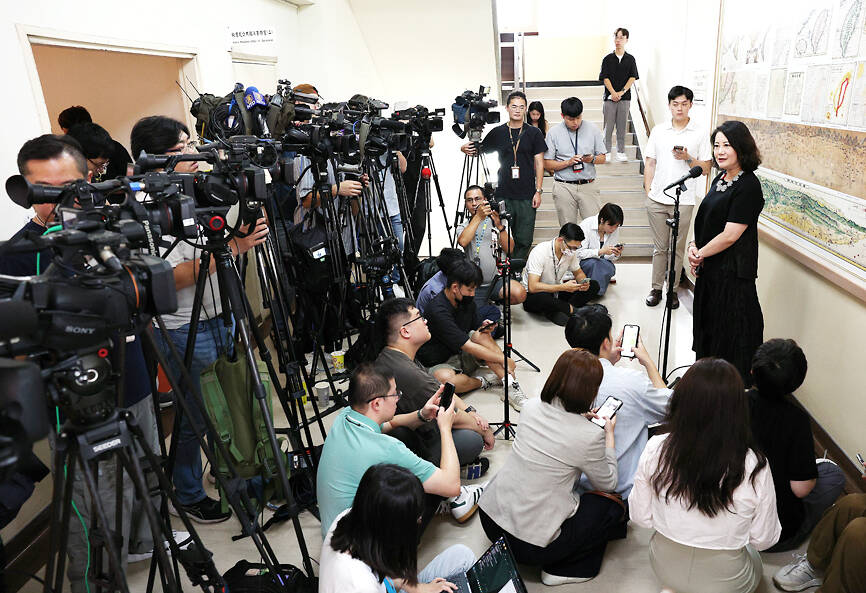Democratic Progressive Party (DPP) Secretary-General Lin Yu-chang (林右昌) yesterday said that he has submitted his resignation, after the mass recall backed by his party failed over the weekend.
Lin wrote on Facebook that he tendered his resignation to President William Lai (賴清德), who is also DPP chairman, on Sunday.
As the ruling party’s secretary-general, Lin said he is responsible for any shortcomings and failures to meet the expectations of society and party supporters.

Photo: CNA
He also praised recall campaign volunteers for their selfless spirit, courage and unwavering commitment to Taiwan.
“What we need least is to make excuses for the outcome. Instead, we move forward,” Lin said, adding that while there are many challenges, people must continue to defend Taiwan.
His announcement came after all 24 Chinese Nationalist Party (KMT) lawmakers survived the recall bids against them on Saturday, ensuring that the KMT, along with Taiwan People’s Party, retains control of the legislature.

Photo: CNA
As of press time last night, Lai had not accepted Lin’s resignation.
Another round of seven KMT legislators are to face recall votes on Aug. 23.
The DPP must shoulder even greater responsibility and be more proactive in the next recall vote, and provide support to the seven districts that would be voting, DPP caucus chief executive Rosalia Wu (吳思瑤) said yesterday.
The DPP would listen to all public opinion and feedback, Wu said, adding that criticism is to be expected, but the party would withstand it.
The party would not let recall groups or citizens face the next recall votes alone, and would put its all into the campaign, she said.
Saturday’s vote encompassed a wide area, given it involved 24 electoral districts, and was made more difficult by the fact that most are KMT strongholds, Wu said.
For the next recall vote, the DPP could focus its energy and resources on the seven districts, Wu said, adding that she hoped party headquarters would enact more strategic planning.

Nipah virus infection is to be officially listed as a category 5 notifiable infectious disease in Taiwan in March, while clinical treatment guidelines are being formulated, the Centers for Disease Control (CDC) said yesterday. With Nipah infections being reported in other countries and considering its relatively high fatality rate, the centers on Jan. 16 announced that it would be listed as a notifiable infectious disease to bolster the nation’s systematic early warning system and increase public awareness, the CDC said. Bangladesh reported four fatal cases last year in separate districts, with three linked to raw date palm sap consumption, CDC Epidemic Intelligence

The manufacture of the remaining 28 M1A2T Abrams tanks Taiwan purchased from the US has recently been completed, and they are expected to be delivered within the next one to two months, a source said yesterday. The Ministry of National Defense is arranging cargo ships to transport the tanks to Taiwan as soon as possible, said the source, who is familiar with the matter. The estimated arrival time ranges from late this month to early next month, the source said. The 28 Abrams tanks make up the third and final batch of a total of 108 tanks, valued at about NT$40.5 billion

Two Taiwanese prosecutors were questioned by Chinese security personnel at their hotel during a trip to China’s Henan Province this month, the Mainland Affairs Council (MAC) said yesterday. The officers had personal information on the prosecutors, including “when they were assigned to their posts, their work locations and job titles,” MAC Deputy Minister and spokesman Liang Wen-chieh (梁文傑) said. On top of asking about their agencies and positions, the officers also questioned the prosecutors about the Cross-Strait Joint Crime-Fighting and Judicial Mutual Assistance Agreement, a pact that serves as the framework for Taiwan-China cooperation on combating crime and providing judicial assistance, Liang

Reports of Taiwanese going missing, being detained or interrogated, or having their personal liberties restricted in China increased about fourfold annually last year, the Mainland Affairs Council (MAC) said yesterday. Last year, 221 Taiwanese who traveled to China were reported missing, were detained and interrogated, or otherwise had their personal freedom restricted, up from 55 the previous year, the council said. Reopening group tours to China would be risky, as it would leave travelers with no way to seek help through official channels after Beijing shut down dialogue between the associations tasked with handling cross-strait tourism, the MAC said. Taipei’s Taiwan Strait Tourism